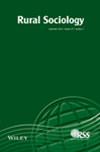Towards an Emplaced Vocabulary of Motive: Senses of Place and Land Sale Decision‐Making in the Northern Great Plains*
IF 1.9
3区 社会学
Q2 SOCIOLOGY
引用次数: 0
Abstract
One of the most remote regions in the contiguous United States, the Upper Missouri River Breaks in the Northern Great Plains of Montana is both “cattle country” and “pristine prairie”: an identity that brings repeated tension over land use. Over the last twenty years, a conservation organization with a mission to rewild the region has purchased thousands of acres of ranchland from willing sellers despite widespread agricultural community resistance. In this study, I interview those who chose to sell and those who chose to stay, and I ask how landowners justify their decisions to sell, or not sell, their land. By using what C. Wright Mills calls “vocabularies of motive,” I investigate two central questions. The first asks why a landowner would sell land against what social norms would dictate to be “right.” The second asks why a landowner would not sell land, given the perceived inevitable eventual loss of a regional agricultural livelihood. I suggest one way to understand these questions is by considering how senses of place shape what decision‐makers believe to be the most justifiable course of action. Extending the vocabulary of motive framework to include senses of place better informs the understanding of land sale decision‐making. Though deeply contextual, the themes running through this case (i.e., ongoing existential threats to the agricultural industry, booms in the buying power of private philanthropists, and decision making in socially and politically contentious spaces) are relevant to a broader understanding of shifts within agricultural communities and the ongoing perceived “battle” between production and conservation.迈向动机的地方词汇:北部大平原的地域感与土地出售决策*
位于蒙大拿州北部大平原的密苏里河上游断裂带是美国毗连地区中最偏远的地区之一,这里既是 "牧牛之乡",又是 "原始草原":这一身份带来了土地使用问题上的反复紧张。在过去的二十年里,一个以该地区野生化为使命的保护组织不顾农业社区的普遍抵制,从愿意出售者手中购买了数千英亩的牧场土地。在这项研究中,我采访了那些选择出售和选择留下的人,并询问土地所有者如何证明他们出售或不出售土地的决定是合理的。通过使用 C. Wright Mills 所说的 "动机词汇",我研究了两个核心问题。第一个问题是,为什么土地所有者会违反社会规范出售土地?第二个问题是,为什么土地所有者不出售土地,因为他认为最终不可避免地会失去地区农业生计。我认为,理解这些问题的一种方法是考虑地方感如何影响决策者认为最合理的行动方案。将动机框架的词汇扩展到地方感,可以更好地理解土地出让决策。尽管有深刻的背景,但贯穿本案例的主题(即农业产业面临的持续生存威胁、私人慈善家购买力的激增以及在社会和政治争议空间中的决策)与更广泛地理解农业社区内部的转变以及生产与保护之间持续的 "斗争 "是相关的。
本文章由计算机程序翻译,如有差异,请以英文原文为准。
求助全文
约1分钟内获得全文
求助全文
来源期刊

RURAL SOCIOLOGY
SOCIOLOGY-
CiteScore
4.60
自引率
13.00%
发文量
47
期刊介绍:
A forum for cutting-edge research, Rural Sociology explores sociological and interdisciplinary approaches to emerging social issues and new approaches to recurring social issues affecting rural people and places. The journal is particularly interested in advancing sociological theory and welcomes the use of a wide range of social science methodologies. Manuscripts that use a sociological perspective to address the effects of local and global systems on rural people and places, rural community revitalization, rural demographic changes, rural poverty, natural resource allocations, the environment, food and agricultural systems, and related topics from all regions of the world are welcome. Rural Sociology also accepts papers that significantly advance the measurement of key sociological concepts or provide well-documented critical analysis of one or more theories as these measures and analyses are related to rural sociology.
 求助内容:
求助内容: 应助结果提醒方式:
应助结果提醒方式:


